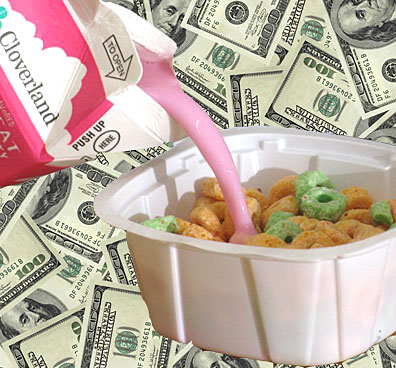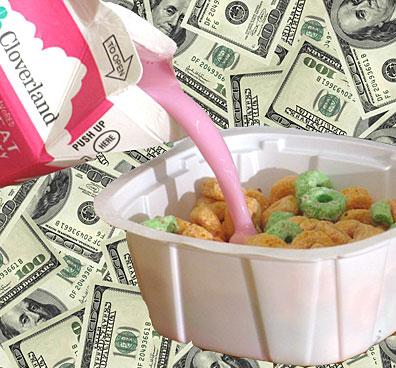 When times get tough, the first thing to go, apparently, is better school food.
When times get tough, the first thing to go, apparently, is better school food.
D.C. Mayor Adrian Fenty, attempting to close a $188 million gap in the city’s budget, has proposed eliminating funds that had been designated for better school meals as part of a “Healthy Schools” initiative approved earlier this year, which I reported on here.
The budget measure would halt payment of some $4.6 million that was to pay an extra 10 cents for every breakfast served in D.C. public schools, an extra 10 cents for every lunch, and 5 cents for every lunch meal that contained a locally grown component.
The legislation, which was months in the making and funded only after a dramatic controversy over a proposed “soda tax,” had placed the District of Columbia in the forefront of local jurisdictions attempting to improve the quality of meals children eat at school. The extra funding, in addition to some $7 million in deficit spending the schools currently contribute to the food program, would have made D.C. one of the most generous school districts in the country where its meals are concerned.
Healthier food advocates today were scrambling to determine exactly what effect Fenty’s proposed budget measure would have. It was thought that the funds in question had been garnered exclusively by placing a sales tax on soft drink and were dedicated to funding better school meals.
The “Healthy Schools” legislation took effect at the beginning of the current school year in August and had an immediate impact on the meal service. Because I monitor breakfast and lunch service at my daughter’s elementary schools, I could see that fruits and vegetables grown here in the Mid-Atlantic region were appearing on kids’ cafeteria trays on a daily basis.
At the same time, a new food services director for D.C. public schools, Jeffrey Mills, had removed flavored milk as well as a number of sugary, processed foods such as Pop-Tarts and Apple Jacks from the schools and had completely revamped the menu served by Chartwells, the system’s hired food service provider.
D.C. Councilmember Mary Cheh (D-Ward 3), who authored the bill and had spent months working out its details with various local nonprofit groups, health authorities, and food access advocates, told The Washington Post, “I’m trying to be open-minded about this. If everyone is going to feel the pain, everything is going to be on the table,”
Andrea Northup, coordinator of the D.C. Farm to School Network, who was one of the leaders in crafting the school food aspects of the legislation, vowed to fight the proposed budget action.
“For the Fenty administration to champion the Healthy Schools Act as a model for the nation, and then to cut funding for the act, they have done a grave disservice to the children of the District of Columbia,” Northup said. “We’re talking about high-risk youth: three in four are at risk of hunger, one in three are overweight or obese, and most eat their daily meals at school. As an advocacy community, we won’t let this stand.”
Nationally, legislation that would add a mere 6 cents to the $2.72 the federal government pays for a subsidized lunch is stalled in Congress because it would be funded by more than $2 billion taken from the food stamp program.



